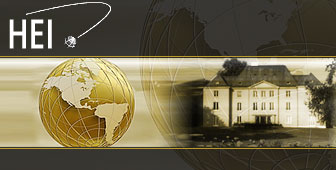
UN membership offers grand old institute new opportunities

On its 75th birthday, one of Switzerland's most prestigious academic institutions believes it has a role to play in developing Swiss foreign policy.
After three-quarters of a century training future decision-makers, Geneva’s Graduate Institute for International Studies (GIIS) is using its anniversary celebrations to ponder its future role.
Its director insists that it has a major role to play in shaping Switzerland’s new assertive foreign policy, even if the federal government has seemed reticent to harness its resources.
On Friday and Saturday, the GIIS is holding two days of conferences on the theme of globalisation to mark its anniversary.
Among those participating in the celebrations is a former GIIS student, United Nations secretary general Kofi Annan. Annan, who studied at the institute from 1961 to 1962, was made an honorary citizen of Geneva on Thursday night and received a doctorate from Geneva University on Friday.
The GIIS was created in 1927 as a kind of intellectual and moral arm of the League of Nations. Despite the collapse of this forerunner to the United Nations, the institute remained. Its reputation as a haven of academic freedom, especially for those fleeing Nazi Germany, quickly grew.
Intelligence over power
Today, according to its director, Peter Tschopp, its underlying philosophy remains unchanged: the supremacy of intelligence and the rule of law over sheer power.
The institute also continues to make the most of its strategic location in Geneva, close to numerous international organisations and multinational companies, and remains a centre of excellence in the fields of international law, economics, history and political science.
“We develop the actors in the international politics of tomorrow – whether they serve governments or multinationals. That’s our business, and we’re proud of it,” Tschopp told swissinfo.
Since the fall of communism, Tschopp says, the goalposts have shifted for institutions like the GIIS – now instead of Cold War politics, there is globalisation and the rise of non-governmental agencies
“The actors of globalisation are no longer nation states, and we have to reflect that,” he says.
Foreign affairs is the responsibility of the federal government, yet Geneva taxpayers provide 60 per cent of the Institute’s funding. Tschopp argues that the GIIS’s status should be changed to that of a Federal Technical Institute.
Potential unfulfilled
“The federal government is not using the institute’s potential to the full,” Tschopp says. Once, spending time at the institute was almost an obligatory rite of passage for Swiss diplomats. Now that is no longer the case.
With Switzerland preparing the join the UN in September, he says, “the government is obliged to redefine its foreign policy. It needs to ask itself if it is doing all it can for this institution,” he adds. One thing Bern could do, he suggests, is to increase bursaries for foreign students.
He says Switzerland’s traditional role of offering its good offices is a thing of the past: “Instead, it could offer delayed-action good offices, by training the international elites of tomorrow.”
“It’s no good being the last country to join the United Nations. We have to have something to offer,” he adds.
Financial constraints mean limited places – and that means highly qualified applicants are being turned away. For every successful candidate, four are rejected.
Cash lacking
At the time of its creation, the GIIS was the only institute devoted to the study of international relations in the world. Now there is a plethora.
The institute has seen a number of competitors – the John F Kennedy Centre in Boston, the University of Colombia, Oxford University, and the London School of Economics, for example – rivalling, and some would say overtaking, its position, not because of a drop in standards in Geneva, but rather as a result of these other institutions having more students, teaching staff and money.
“To be competitive with this crowd, we need money,” Tschopp told swissinfo.
But despite the cash constraints, the GIIS’s survival in not in question, says a former GIIS secretary general, Jean-Claude Frachebourg. “The excellence of its teaching and its research will keep it alive. As small as it is, and faced with competition from universities with much greater means, it has no option but to rely on quality.”
However, the stiffer competition, is forcing the GIIS to make some important strategic choices.
External links
There has been greater emphasis placed on an interdisciplinary approach within the Institute, while strong links are being developed with external institutions.
In collaboration with local universities, the Swiss and Geneva governments, UN agencies and the International Committee of the Red Cross, the GIIS has recently helped to create the Geneva International Academic Network (GIAN) and the Centre for International Humanitarian Law.
It has also joined the Association of Professional Schools of International Affairs, which includes some of the best English-language institutes in this field.
Tschopp took over in 1998 as a transitional figurehead. When he steps down in October, he will have been in the post four years. He says he wants his successor to be a “visionary” who will lead the Institute for ten years.
One thing is certain. That person will face a host of challenges.
by Roy Probert

In compliance with the JTI standards
More: SWI swissinfo.ch certified by the Journalism Trust Initiative

























You can find an overview of ongoing debates with our journalists here . Please join us!
If you want to start a conversation about a topic raised in this article or want to report factual errors, email us at english@swissinfo.ch.